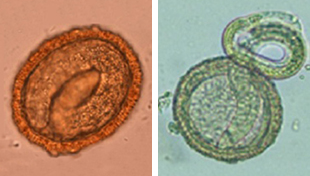Key points
- Some parasites can cause meningitis or affect the brain or nervous system in other ways.
- Meningitis from parasites is less common than viral and bacterial meningitis.
- Diagnosis can be hard.
- Treatment to reduce the body's reaction to the parasite is important.
- Learn what you can do to prevent parasitic meningitis.

What it is
Meningitis is an inflammation (swelling) of the protective lining of the brain and spinal cord that can be caused by a parasitic infection. Meningitis caused by parasites is called EM which is short for either:
- Eosinophilic meningitis
- Eosinophilic meningoencephalitis
Symptoms
People with parasitic EM who have symptoms can have typical meningitis symptoms. In some cases, they may also have an eye infection.
People with EM caused by A. cantonensis often have tingling or painful feelings in their skin.
When to seek emergency care
Complications
These parasites can cause severe complications, such as
- Loss of coordination and muscle control
- Weakness/paralysis
- Coma
- Permanent disability
- Death
Risk factors
Risk factors vary by parasite, but can include age, geographic location, and what you eat.
A. cantonensis
Most of these infections are diagnosed in Southeast Asia and the Pacific Islands, including in Hawaii. Infections have been identified in other areas, including Africa, the Caribbean, and the continental United States.
B. procyonis
This parasite infects raccoons throughout the United States, mainly in the Midwest, Northeast, Middle Atlantic, and West Coast.
People in these areas who come in contact with raccoon feces (poop) are at increased risk. Young children are also at risk due to increased likelihood of putting contaminated fingers, soil, or objects in their mouths.
G. spinigerum
This infection is most commonly diagnosed in Southeast Asia, particularly in Thailand, and Japan.
How it spreads
These parasites normally infect animals not people. People get infected primarily by:
- Eating infected slugs, snails, or contaminated foods
- Accidentally eating raccoon feces
Typical source of infection
- A. cantonensis: Raw or undercooked snails or slugs, contaminated produce
- B. procyonis: Environments (such as dirt) contaminated with raccoon feces
- G. spinigerum: Raw or undercooked freshwater fish or eels, frogs, poultry, snakes
How it doesn't spread
Generally, people don't spread parasitic meningitis or the parasites that cause it to other people.
Reducing risk
Visit CDC's website for each parasite to learn specifics on how to prevent infection with these and other parasites. Generally, you can reduce your risk in the following ways:
- A. cantonensis: Don’t eat undercooked or raw slugs or snails
- B. procyonis: Avoid contact with raccoons and their feces
- G. spinigerum: Don’t eat undercooked or raw fish or poultry, especially in Southeast Asia and Japan
Testing and diagnosis
In addition to laboratory tests for meningitis, healthcare providers look for evidence of parasitic infection. It's often hard to find these parasites.
The following may be helpful for making a diagnosis:
- Travel or exposure history
- Clinical examination
- Other medical tests, such as brain scans
